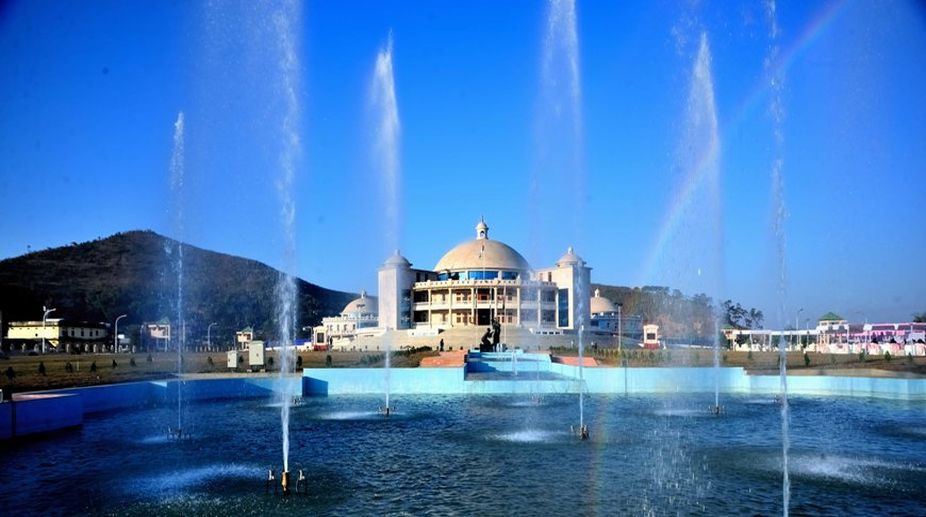Manipur to Shut Down Relief Camps by December
In a move towards restoring normalcy, the Manipur government has announced plans to close down nearly 350 relief camps housing Internally Displaced Persons (IDPs) by December 2025.

Manipur Legislative Assembly (Photo: Facebook)
Territorial integrity of the ancient kingdom of Manipur that had merged with India and the recurring economic blockades by tribal groups are the major issues in Manipur where the upcoming assembly polls are witnessing a close battle between the ruling Congress and the opposition BJP.
Intriguingly, none of the parties has so far stressed on the important issue of employment generation, despite the state having over 800,000 educated unemployed youths out of its less than 2.8 million population.
Advertisement
With the 60-seat assembly slated to hold two-phase polls on March 4 and March 8, campaigning is slowly picking up. The Congress is eyeing a consecutive fourth term in office while the Bharatiya Janata Party (BJP) – which had only one legislator in the outgoing House – is throwing a determined challenge to wrest power.
Advertisement
The path ahead looks far from rosy for the Congress due to resignations, the anti-incumbency factor and the warning from an outfit to tribal politicians not to contest on tickets of the Grand Old Party.
Phungzathang Tonsing, the number two in the state cabinet for many years, resigned from the Congress despite being given a ticket. "Manipur is a small place and people know what the Congress is doing," Tonsing said cryptically, while declining to elaborate.
The Congress got more jolts as Parliamentary Secretary V Valte, lone tribal woman MLA Nemcha Kipgen and some other prominent lawmakers, who had been ministers for a long time, quit the party and crossed over to the BJP.
The Congress decision to nominate a Nepali, G Tamang, for the tribal-dominated but unreserved Kangpokpi seat also sparked a controversy and the anti-outsider campaign in the form of a demand for the Inner Line Permit system gained momentum.
Finally, bowing to pressure, the Congress withdrew Tamang's ticket and he is now in the fray as an independent.
Nineteen seats of the 60 in the assembly are reserved for tribals.
Chief Minister Okram Ibobi, who launched his campaign on Sunday, exuded confidence about a Congress victory on the strength of the development work undertaken by the party during its 15 years in power.
But he has so far declined to comment on the burning issues of tribals being asked not to contest on the Congress ticket and the controversy generated over Tamang.
The BJP is banking on a "(Narendra) Modi" wave.
The never-ending economic blockades over even mundane issues like inadequate power supply or thin attendance in offices feature in a big way as candidates try to drum up support.
The BJP and some other parties have assured of a "blockade-free Manipur" if voted to power.
The tiny Northeastern state has been facing an economic blockade since November 1, 2016 in protest against the creation of seven new districts.
The United Naga Council, backing the blockade, says these districts had divided the "lands of the Nagas" left by their forefathers. The Manipur government has countered by saying that no community is the land owner.
N Biren, a long time Congress minister who is now the BJP spokesperson, said: "The Congress and the United Naga Integration Council had signed an agreement on August 4, 1972. The Congress had agreed, inter alia, that the Naga demands are not unconstitutional and had accepted them."
Countering, Ibobi Singh has demanded that the Modi government's framework agreement with the NSCN-IM be disclosed, amidst fear in many circles that it envisages vivisection of Manipur, bowing to the long-standing NSCN-IM demand for "Naga integration".
The NSCN has been demanding unification of all Naga-inhabited areas in Manipur, Assam and Arunachal Pradesh under the umbrella of Nagaland. This has been opposed by the people and governments of the three states all these years.
The Manipur government's consistent position is that the state had a well-defined territory since 33 AD, with a written chronicle stretching for over 2000 years. The state was merged with India on October 15, 1949.
Ibobi Singh pointed out that in 2001, when the Atal Bihari Vajpayee government at the Centre extended the ceasefire with the NSCN-IM without territorial limits, the state had been in flames, with 18 persons losing their lives.
Advertisement
In a move towards restoring normalcy, the Manipur government has announced plans to close down nearly 350 relief camps housing Internally Displaced Persons (IDPs) by December 2025.
Preparations are on for the likely visit of Prime Minister Narendra Modi to trouble-torn Manipur, sources said.
In a strongly-worded statement, Singh said the Aadhaar verification process must not operate in isolation and should strictly align with the provisions of the ILP system, which regulates entry of non-locals into the state.
Advertisement
